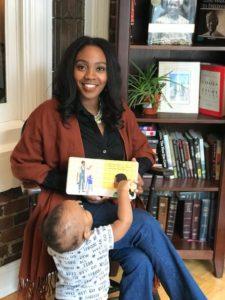Browne ’20MEd Brings Racial Literacy into Classrooms with Colorful Stories

“I don’t believe that children are blank canvases,” said early childhood educator Lisa Browne ’20MEd. “I think that they’re bringing things to conversations and they’re still making meaning of the world around them, as well as how they fit into the world.”
That’s why she believes it’s integral to address issues of race and inequity with young children. Browne has devoted her career to making a difference in the lives of young children through her organization Colorful Stories, which provides families and educators the tools to address topics such as inclusion and racism with children who are infants to 8 years old. Born in Johannesburg, South Africa, and resident of the West Mt. Airy neighborhood in Philadelphia, Browne aims to transform early childhood education into a practice that positively affirms the identities of Black, Asian, Indigenous, and Brown children.
“One of the things with pushing into those harder conversations is that I’m looking to see what children already know,” said Browne. “I’m supporting them reflecting on some of the ideas and experiences that they’ve had, as well as factually sharing in developmentally appropriate ways, which is giving them more context.”
Browne’s career in early childhood development began as a preschool teacher, and later as a pedagogical instructional administrator. She then earned a Pennsylvania Quality Assurance System (PQAS) Certification to work as a professional development instructor. As a graduate student in the Early Childhood Education program at Arcadia University, Browne’s thesis “Colorful Stories Presents Colorful Conversations: Explicit Conversations About Race, Racism, and Inequity” provided families and educators practical tools to promote racial literacy in the classroom and in the home, such as utilizing picture books to teach children about social issues and advocacy. Browne’s inspiration when selecting picture books: social advocate Rudine Sims Bishop’s philosophy that “children’s books should be mirrors, windows, and sliding doors.”
“Books can be mirrors in that the way when children open these books, they should be able to see themselves reflected,” said Browne. “Books can be windows in that they allow children to see into a world which may or may not match their own world. And sliding doors refers to the fact that books allow children to travel in and out of those worlds.”
While having diversity in children’s books is important, Browne stresses on the importance of parents and educators following up with discussions that engage the child in thinking reflectively about the story.
“You’ve got the books, but now you have to roll up your sleeves and do the work—and the work is ongoing,” said Browne. “The work is not one conversation, and it’s not one book reading. It’s conversations on conversations that will help us create a better future for kids like mine.”
For the future of Colorful Stories, Browne hopes to expand her network and develop a collaborative team which supports her mission. Currently, Browne is working with a graphic designer to create affirmation cards for Black families and children. Affirmation cards are notes with daily reminders of encouragement that uplift self-care and foster a positive self-image. Once the affirmation cards are completed, families will be able to download them on Browne’s website.
“I’m a mom, so this work is deeply personal to me,” said Browne. “I am raising a Black boy here in America, who I understand will hear very different messaging outside of this household. So [the work] starts here at home.”


